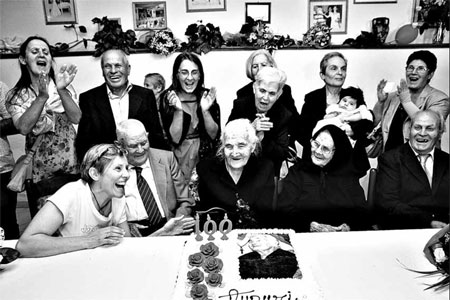Praising age, fretting over future
Updated: 2013-07-28 08:28
By Rachel Donadio(The New York Times)
|
|||||||
|
Consolata Melis, 105, right, and her siblings enjoy close family ties. Gianni Cipriano for The New York Times |

PERDASDEFOGU, Italy - On a recent Sunday afternoon, hundreds of villagers gathered in this tiny Sardinian town to celebrate the 100th birthday of Claudina Melis, one of its esteemed citizens. Next to Ms. Melis in the front pew was her 105-year-old sister, Consolata; they both had dark kerchiefs and wore traditional black widows' garb. Nearby sat five other Melis siblings, all older than 85, and their families.
In 2012, the Melis family entered the Guinness World Records for having the highest combined age of any nine living siblings on earth - today more than 825 years. Sustained by good genes, fresh air, healthy food, physical exercise, quick wit and powerful family bonds, the Melises have become symbols of a Mediterranean way of life that is the envy of the world.
Few of the nine Melis siblings have formal education beyond fifth grade. (Claudina and Consolata stopped at the second.) Many of their children have high school diplomas or university degrees and are retired. And their children, the ones born after 1970, generally have university degrees - and are struggling to find work.
As people in the Mediterranean are living longer, fertility rates are low and youth unemployment is soaring in Italy, Greece, Spain and Portugal. As a result, experts warn that Europe's debt crisis is exacerbating a growing demographic crisis. In the coming years, they warn, there will be fewer workers to support the pensions of older generations.
"Absolutely, we're in big trouble," said Mariano Carta, 44, Perdasdefogu's mayor. "We may have good air, but without work, we can't survive."
High up in the mountains of eastern Sardinia, Perdasdefogu, whose economy revolves around a military base under scrutiny for possible uranium contamination, has lost 500 inhabitants in 20 years, its population dropping to 2,000. Today it has two pensioners for every worker, an average age of 47 and an unemployment rate of about 25 percent. "If we go on like this, the system won't hold up for long," Mr. Carta said.
Between 2001 and 2011, the number of centenarians in Italy rose 138 percent, and that of people in their 90s rose 78 percent. In 2011, the most recent year in the official statistics, 20 percent of Italians were over the age of 65.
The Melis siblings were all born in Perdasdefogu to Francesco Melis and Eleonora Mameli, who had a general store. Consolata, 105, is the oldest; then Claudina, 100; Maria, 98; Antonino, 94; Concetta, 92; Adolfo, 90; Vitalio, 87; Fida Vitalia, 81; and Mafalda, the baby, at 79. Their descendants account for about a third of the village.
The siblings remember when malaria was rampant in Sardinia before it was eradicated with the help of the United States after the Second World War. They remember the time before Perdasdefogu got electricity in the 1950s, and before it had running water. "We used to have to carry a bucket to the well," said Claudina.
"Young people today don't know what it is to work," she said. She meant that they had not known hard physical labor. But the remark could just as easily apply to Italy's youth unemployment rate, which is 38 percent. Many leave for better jobs abroad.
Stefano Lai, 27, one of Claudina's many grandchildren, grew up in Cagliari, the capital of Sardinia, and is now doing a postdoctoral fellowship in biomedical engineering in Pisa.
"Leaving Sardinia was hard for me," Mr. Lai said. "To leave Italy would be hard, but maybe it's inescapable."
Stefano's parents, Italo Lai, 77, who retired from a job in public health, and Marina Caria, 68, were saddened at the prospect. "It's a brain drain," Ms. Caria said. "We hope that maybe they can find something to keep them," she added.
Most of the nine Melis siblings have lived their entire lives in the same village.
On the day before her birthday, Claudina laughed when asked how she passed the time each day: "I move from one chair to another."
The New York Times
|
Claudina Melis, center, at her 100th birthday party, and her siblings are a symbol of the Mediterranean way of life. Gianni Cipriano for The New York Times |
(China Daily 07/28/2013 page9)

